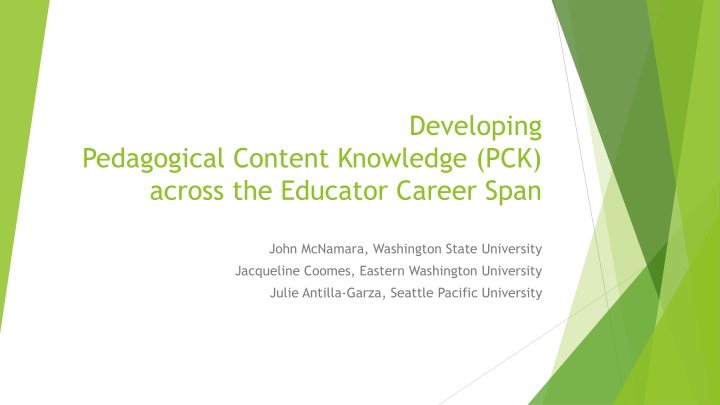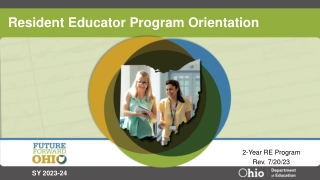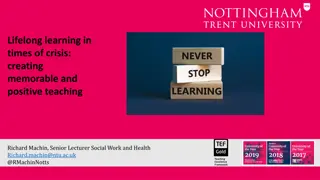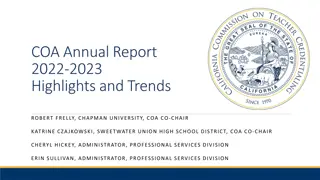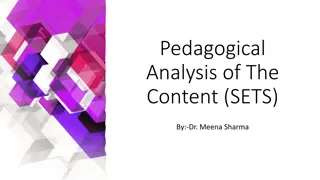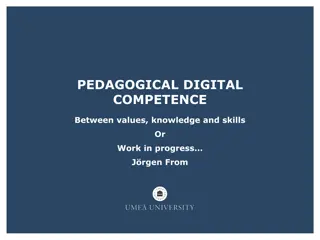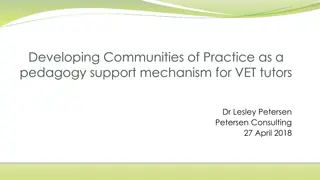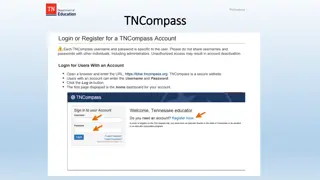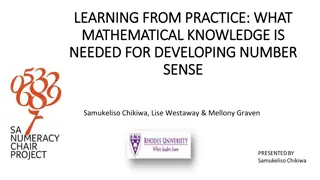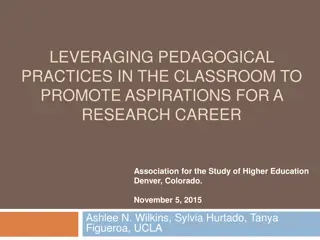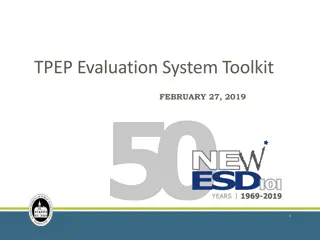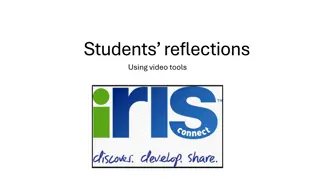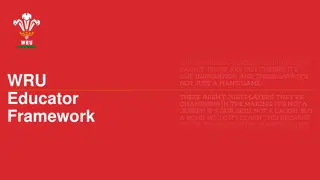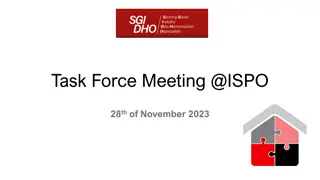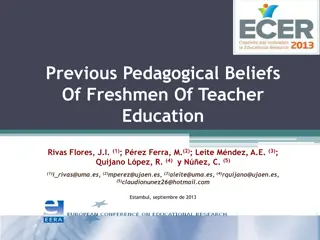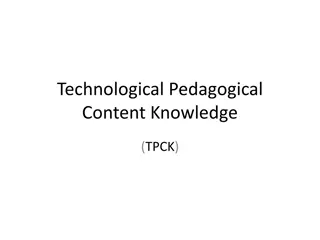Developing Pedagogical Content Knowledge (PCK) for Educator Excellence
Explore how Developing Pedagogical Content Knowledge (PCK) throughout an educator's career enhances student learning and growth. Learn strategies to integrate content knowledge, pedagogy, and socio-emotional learning effectively. Discover the progression of teacher development from recruitment to leadership roles, supported by research from leading universities and the National Science Foundation.
Download Presentation

Please find below an Image/Link to download the presentation.
The content on the website is provided AS IS for your information and personal use only. It may not be sold, licensed, or shared on other websites without obtaining consent from the author.If you encounter any issues during the download, it is possible that the publisher has removed the file from their server.
You are allowed to download the files provided on this website for personal or commercial use, subject to the condition that they are used lawfully. All files are the property of their respective owners.
The content on the website is provided AS IS for your information and personal use only. It may not be sold, licensed, or shared on other websites without obtaining consent from the author.
E N D
Presentation Transcript
Developing Pedagogical Content Knowledge (PCK) across the Educator Career Span John McNamara, Washington State University Jacqueline Coomes, Eastern Washington University Julie Antilla-Garza, Seattle Pacific University
Developing Pedagogical Content Knowledge (PCK) across the Educator Career Span Outcomes: Participants will learn how a PCK approach throughout a career will foster personal, building and district wide excellence in meeting student needs. Participants will leave with progression charts illustrating markers of PCK in practice and strategies for using PCK to address CCDEI and SEL standards. This research is supported by the National Science Foundation Division of Undergraduate Education [grant number 1625218]
PCK: The System and the Parts (Do I have to do it all?) PCK recognizes that: Any one teacher is part of a team Deep skills must be developed over time. At a given day and time, a teacher must focus on a subject, but still deal with many students. In the context of: a lesson, bundle, curriculum, building culture. a district (neighborhood, city, state, tribal) culture. student assessment and teacher (re) certification.
Using Pedagogical Content Knowledge PCK is an approach that combines content, curriculum and pedagogical knowledge deeply connected to an understanding of student learning and growth. Integrating strong content knowledge, pedagogical methods, culturally responsive teaching, and fostering social and emotional learning. A progression of teacher development from recruitment, teacher preparation, early and mid-career stages, to teacher leadership and administration.
Our Charge: Forwarding The System The School I went to (Recruitment) College/University Departments (Preparation) The School I (will) teach in (Residence, Induction, Experience, Leadership) The Building District, ESD, State (Administrator, Specialists) The Decisions Makers, Implementors, Supporters The Citizenry The Legislature and Governor s Office, SBOE, Higher ED The OSPI and PESB
PCK: Individual Development Over Time Recruitment The individual s K-8, HS, early college experience Preparation The Subject Dept > the STEM Ed Dept. Residency Where will I teach? Who will I teach? New Teacher support (or not). Induction Ok, I think I have a general understanding Experienced I would like to help that new teacher Leadership I want a building full of vibrant, resilient, caring, capable Administration teachers in a team.
Developing PCK for inquiry teaching Dispositions and beliefs Learning through inquiry methods and to improve those methods are at the heart of learning science. Students at any level can learn science and mathematics through inquiry. Disciplinary-specific practices (DSP) Habits of mind of mathematicians and scientists engaged in their work. Science and Engineering Practices as described in the NGSS. Standards of Mathematics Practices as described in CCSS.
Developing PCK for inquiry teaching Continuum of a teacher s career: Recruitment: Engage in math and science with an inquiry approach. Preparation: Articulate and identify the role of inquiry in their students learning. Use 5E model or 5 Practices model to support lesson design and implementation. Residency: Transform and expand their content knowledge to PCK for teaching through inquiry. Induction: Persist in teaching through inquiry by identifying specific areas to work on. E.g. argumentation, elaboration, DSP assessment, .
Developing PCK for inquiry teaching Continuum of a teacher s career: Experienced: Engage in additional inquiry learning themselves. Leadership: Mentor newer teachers; engage in lesson- studies or lead PLCs to plan new inquiry lessons. Administration: Support robust inquiry teaching by connecting it to building goals and professional development.
Developing PCK for Culturally-Responsive Teaching Recruitment: Recruited from among all populations and those who have enhanced their STEM learning with their familial, cultural, and linguistic capital. Preparation: Explore and include STEM knowledge in lessons as it relates to students with varied backgrounds and experiences. Residency: Transform and expand their STEM knowledge to motivate and build their students' knowledge and their students' identities as STEM-doers. Induction: Identify areas of strengths in their students and leverage those to improve lessons.
Developing PCK for Culturally-Responsive Teaching Experienced: Engage with teachers, families, communities, and higher education to better understand and build inclusive environments. Leadership: Mentor other teachers and highlight issues in discipline-specific PLCs when examining curriculum to build more culturally-sustaining lessons. Administration: Help teachers use their PCK to empower all students, regardless of their background, to excel in math and science.
Developing PCK for Integrated STEM teaching Recruitment: Recruit teacher candidates who are curious about how all STEM works and who see connections and distinctions among the concepts. Preparation: Look for connections and distinctions among the SEP and SMP to plan lessons that support students' development of STEM ways of thinking. Residency: Use science examples in math lessons or develop math concepts in science lessons.
Developing PCK for Integrated STEM teaching Induction: Work with teachers across STEM disciplines to integrate conceptual learning across the curriculum. Experienced: Take classes and work with other teachers to build PCK knowledge across STEM disciplines. Leadership: Reach out to teachers from other STEM disciplines to create collaborative projects for students. Administration: Promote STEM learning across the curriculum using building-wide goals.
PCK Culturally Responsive Inquiry Integrated STEM
PCK Across the Educator Career Span Recruitment Preparation Residency Induction Experienced Leadership Administration PCK Focus PCK Practice PCK Developm ent
PCK Focus Recruitment Disposition to listen critically to understand others ideas about the content Preparation Disposition to learn through an interplay: thinking about pedagogy and thinking about content Residency Disposition to identify personal strengths and needs as STEM teachers Induction Disposition of life-long learning and continual improvement Experienced Disposition of curiosity and intentionality Leadership Disposition to understand how teachers develop Administration Recruitment and retention of teachers who have a disposition toward inquiry and development of personal PCK Continual refinement through reflection on teaching Articulation of PCK and its connections to other aspects of teaching Nuanced understanding of students, curriculum, and how to facilitate inquiry-based lessons using multiple tools Depth of STEM content knowledge Development and practice of routines for each PCK subdomain Awareness of relationship of content to students culture, strengths, and interests Capacity to understand, observe, coach, and evaluate PCK in inquiry lessons Engagement with other teachers around common goals for student learning Articulation of ways to use disciplinary- specific practices (DSP) Willingness to share their teaching experiences to help build other teachers PCK Anticipation of ways students might engage in an inquiry- based lesson, including student thinking Promotions of a culture of inquiry and support of research cycles schoolwide Integration of knowledge of inquiry with building-wide goals and work of professional learning communities (PLC) Skills of disciplined inquiry Value for inquiry-based learning as a way for students to learn content Use of PCK for all content and all students Practice of shared decision making Ability to understand the validity of alternate conceptions Consideration of various responses and impacts of student ideas and reasoning Exploration of PCK in interdisciplinary contexts Development of PCK for all content and students they teach
PCK Practice Recruitment Preparation Residency Induction Experienced Leadership Administration Build connected and deep content knowledge Build capacity and skills to understand students' strengths, thinking, and cultures. Integrate understanding of PCK with state standards and classroom curriculum to adapt tasks for students Realize that all students are capable of being STEM learners and doers Provide time and space for all students to confront their partial, and alternate conceptions Know in a deep and articulated way inquiry-based teaching Describe how teachers' PCK development relates to theories of learning, and to their building and district goals Use and articulate DSP Listen to other teachers and support them in their development Help new teachers build content, pedagogy, curriculum, and assessment strategies Interpret students' alternate conceptions and responses and help students construct more robust conceptual understanding See STEM as dynamic disciplines and value multiple ways of solving problems and investigating through inquiry Consider the implications of pedagogical knowledge for particular content Work with teachers to design and study the effects of specific inquiry lessons Support PD that is designed as long- term engagement with teacher PCK development and inquiry practice in the classroom Interpret and reflect on student responses as evidence of conceptions and DSP Use Universal Design for Learning for multiple means of representation, action, and engagement Use a variety of disciplinary- specific representations to engage students in their learning Develop PCK by reading adopted curriculum and professional articles Encourage teaching of cross-cutting concepts such as ELA-Math cross disciplinary content Reflect on experiences as STEM students and on the nature of the discipline Model lessons and discuss instructional decisions with teachers Use evidence to support professional knowledge of what students know, how inquiry- based lessons advance learning. Recognize that many of the DSP coincide with social emotional learning standards Vary performance assessment opportunities for students Design assessments that recognize student variation
PCK Development Recruitment Tutor or work as lab teaching to model and articulate DSP with students/ peers Preparation Observe inquiry lessons taught by exemplary teachers Residency Examine state content standards to understand how student learning of specific content develops over time Induction Participate in embedded professional development on PCK Experienced Watch teaching videos to review how to interpret and use student thinking to foster student learning Leadership Articulate the connection between PCK and other aspects of teaching such as Social Emotional Learning and Culturally Responsive Pedagogy Administration Meet with department teams to discuss PCK as practiced Anticipate how aspects of planned lessons will affect student learning and how learning relates to unit goals Integrate PCK goals into school site plans Develop relationships with mentor and peers Collaborate with other students to investigate scientific phenomena or solve problems Take graduate level courses on key PCK components Observe, assess, and advise on teachers' integration of all PCK components. Receive PCK mentoring from experienced teachers Build and use a rubric to assess students' engagement in DSP Attend to administrator s feedback on knowledge of content, pedagogy, students, and assessment Work with a team to develop STEM curriculum Support teachers in making deep connections of PCK across content and grade levels Vertically align STEM integration over grade levels Observe university content instructors who model PCK Watch videos of lessons to examine evidence of students' thinking and how the teacher elicits and responds to that thinking Participate in summer research Develop personal and canonical PCK through content units and PLCs Reflect on assignment rubrics and how they support improved learning Work in PLCs to create assessments and analyze evidence of student knowledge Design, use, and analyze assessments to identify changes in students' conceptions Take a lead role in designing and evaluating curricula and assessments Use PCK in support of equitable assessment and grading
Cultural Competency, Diversity, Equity, and Inclusion Standards for Educators (CCDEI) Understanding self and others: When educators understand themselves deeply as diverse cultural beings, they can better serve others across a range of human differences. Student, family and community engagement: Educators include students, families, and communities as valued members of and contributors to the education community. Learning partnerships: Educators create conditions that support partnerships and shared responsibility for learning. Leading for Educational equity: Educators create opportunities and remove barriers to ensure each and every student experiences the full benefit of public education. 1. 2. 3. 4.
PCK Focus and CCDEI Recruitment Disposition to listen critically to understand others ideas about the content (CCDEI 1) Preparation Disposition to learn through an interplay: thinking about pedagogy and thinking about content Residency Disposition to identify personal strengths and needs as STEM teachers (CCDEI 1) Induction Disposition of life-long learning and continual improvement (CCDEI 1) Experienced Disposition of curiosity and intentionality Leadership Disposition to understand how teachers develop (CCDEI 1) Administration Recruitment and retention of teachers who have a disposition toward inquiry and development of personal PCK (CCDEI 4) Continual refinement through reflection on teaching Articulation of PCK and its connections to other aspects of teaching Nuanced understanding of students, curriculum, and how to facilitate inquiry-based lessons using multiple tools (CCDEI 1, 2) Development and practice of routines for each PCK subdomain Depth of STEM content knowledge Awareness of relationship of content to students culture, strengths, and interests (CCDEI 1, 2) Engagement with other teachers around common goals for student learning (CCDEI 3, 4) Capacity to understand, observe, coach, and evaluate PCK in inquiry lessons Willingness to share their teaching experiences to help build other teachers PCK (CCDEI 3, 4) Articulation of ways to use disciplinary- specific practices (DSP) Anticipation of ways students might engage in an inquiry-based lesson, including student thinking Promotions of a culture of inquiry and support of research cycles schoolwide (CCDEI 4) Value for inquiry-based learning as a way for students to learn content Integration of knowledge of inquiry with building-wide goals and work of professional learning communities (PLC) (CCDEI 3, 4) Skills of disciplined inquiry Ability to understand the validity of alternate conceptions Use of PCK for all content and all students (CCDEI 4) Consideration of various responses and impacts of student ideas and reasoning (CCDEI 1, 2) Practice of shared decision making (CCDEI 3, 4) Exploration of PCK in interdisciplinary contexts Development of PCK for all content and students they teach
PCK Practice and CCDEI Recruitment Preparation Residency Induction Experienced Leadership Administration Build connected and deep content knowledge Build capacity and skills to understand students' strengths, thinking, and cultures. (CCDEI 1) Integrate understanding of PCK with state standards and classroom curriculum to adapt tasks for students Realize that all students are capable of being STEM learners and doers Provide time and space for all students to confront their partial, and alternate conceptions (CCDEI 4) Know in a deep and articulated way inquiry-based teaching Describe how teachers' PCK development relates to theories of learning, and to their building and district goals Use and articulate DSP Listen to other teachers and support them in their development (CCDEI 1, 3) Help new teachers build content, pedagogy, curriculum, and assessment strategies Interpret students' alternate conceptions and responses and help students construct more robust conceptual understanding (CCDEI 2) See STEM as dynamic disciplines and value multiple ways of solving problems and investigating through inquiry Consider the implications of pedagogical knowledge for particular content Support PD that is designed as long- term engagement with teacher PCK development and inquiry practice in the classroom (CCDEI 4) Interpret and reflect on student responses as evidence of conceptions and DSP Work with teachers to design and study the effects of specific inquiry lessons (CCDEI 3) Use Universal Design for Learning for multiple means of representation, action, and engagement (CCDEI 2) Reflect on experiences as STEM students and on the nature of the discipline Use a variety of disciplinary- specific representations to engage students in their learning (CCDEI 2) Develop PCK by reading adopted curriculum and professional articles Encourage teaching of cross-cutting concepts such as ELA-Math cross disciplinary content (CCDEI 4) Model lessons and discuss instructional decisions with teachers (CCDEI 1, 3) Use evidence to support professional knowledge of what students know, how inquiry-based lessons advance learning Vary performance assessment opportunities for students (CCDEI 2, 4) Recognize that many of the DSP coincide with social emotional learning standards Design assessments that recognize student variation (CCDEI 2, 4)
PCK Development and CCDEI Recruitment Tutor or work as lab teaching to model and articulate DSP with students/ peers Preparation Observe inquiry lessons taught by exemplary teachers Residency Examine state content standards to understand how student learning of specific content develops over time Induction Participate in embedded professional development on PCK Experienced Watch teaching videos to review how to interpret and use student thinking to foster student learning Leadership Articulate the connection between PCK and other aspects of teaching such as Social Emotional Learning and Culturally Responsive Pedagogy (CCDEI 4) Administration Meet with department teams to discuss PCK as practiced (CCDEI 4) Anticipate how aspects of planned lessons will affect student learning and how learning relates to unit goals (CCDEI 1, 4) Integrate PCK goals into school site plans Develop relationships with mentor and peers (CCDEI 3) Collaborate with other students to investigate scientific phenomena or solve problems (CCDEI 3) Take graduate level courses on key PCK components Observe, assess, and advise on teachers' integration of all PCK components. (CCDEI 4) Receive PCK mentoring from experienced teachers (CCDEI 3) Build and use a rubric to assess students' engagement in DSP Attend to administrator s feedback on knowledge of content, pedagogy, students, and assessment (CCDEI 1) Work with a team to develop STEM curriculum (CCDEI 3) Support teachers in making deep connections of PCK across content and grade levels (CCDEI 4) Vertically align STEM integration over grade levels Observe university content instructors who model PCK Watch videos of lessons to examine evidence of students' thinking and how the teacher elicits and responds to that thinking (CCDEI 2) Participate in summer research Reflect on assignment rubrics and how they support improved learning Develop personal and canonical PCK through content units and PLCs Work in PLCs to create assessments and analyze evidence of student knowledge (CCDEI 3) Design, use, and analyze assessments to identify changes in students' conceptions Take a lead role in designing and evaluating curricula and assessments Use PCK in support of equitable assessment and grading (CCDEI 4)
WA State Social Emotional Learning Standards (SEL) Self-awareness: Individual has the ability to identify their emotions, personal assets, areas for growth, and potential external resources and supports. 1. Self-management: Individual has the ability to regulate emotions, thoughts, and behaviors. 2. Self-efficacy: Individual has the ability to motivate themselves, persevere, and see themselves as capable. 3.
WA State SEL Standards contd 4. Social awareness: Individual has the ability to take the perspective of and empathize with others from diverse backgrounds and cultures. 5. Social management: Individual has the ability to make safe and constructive choices about personal behavior and social interactions. 6. Social engagement: Individual has the ability to consider others and show a desire to contribute to the well-being of school and community.
PCK Focus and SEL Recruitment Disposition to listen critically to understand others ideas about the content (SEL 4) Preparation Disposition to learn through an interplay: thinking about pedagogy and thinking about content Residency Disposition to identify personal strengths and needs as STEM teachers (SEL 1) Induction Disposition of life-long learning and continual improvement Experienced Disposition of curiosity and intentionality Leadership Disposition to understand how teachers develop (SEL 4) Administration Recruitment and retention of teachers who have a disposition toward inquiry and development of personal PCK (SEL 6) Continual refinement through reflection on teaching (SEL 1) Nuanced understanding of students, curriculum, and how to facilitate inquiry-based lessons using multiple tools (SEL 4) Articulation of PCK and its connections to other aspects of teaching Depth of STEM content knowledge Awareness of relationship of content to students culture, strengths, and interests (SEL 4) Development and practice of routines for each PCK subdomain Capacity to understand, observe, coach, and evaluate PCK in inquiry lessons Engagement with other teachers around common goals for student learning (SEL 6) Articulation of ways to use disciplinary- specific practices (DSP) Willingness to share their teaching experiences to help build other teachers PCK (SEL 6) Anticipation of ways students might engage in an inquiry- based lesson, including student thinking (SEL 5) Promotions of a culture of inquiry and support of research cycles schoolwide Integration of knowledge of inquiry with building-wide goals and work of professional learning communities (PLC) (SEL 3, 6) Value for inquiry-based learning as a way for students to learn content Skills of disciplined inquiry Use of PCK for all content and all students Practice of shared decision making (SEL 6) Consideration of various responses and impacts of student ideas and reasoning (SEL 4, 5) Ability to understand the validity of alternate conceptions (SEL 4) Exploration of PCK in interdisciplinary contexts Development of PCK for all content and students they teach
PCK Practice and SEL Recruitment Preparation Residency Induction Experienced Leadership Administration Build connected and deep content knowledge Build capacity and skills to understand students' strengths, thinking, and cultures. (SEL 4) Integrate understanding of PCK with state standards and classroom curriculum to adapt tasks for students Realize that all students are capable of being STEM learners and doers (SEL 4) Provide time and space for all students to confront their partial, and alternate conceptions (SEL 6) Know in a deep and articulated way inquiry-based teaching Describe how teachers' PCK development relates to theories of learning, and to their building and district goals Use and articulate DSP Listen to other teachers and support them in their development (SEL 5) Help new teachers build content, pedagogy, curriculum, and assessment strategies (SEL 6) See STEM as dynamic disciplines and value multiple ways of solving problems and investigating through inquiry Interpret students' alternate conceptions and responses and help students construct more robust conceptual understanding (SEL 6) Consider the implications of pedagogical knowledge for particular content Interpret and reflect on student responses as evidence of conceptions and DSP Support PD that is designed as long- term engagement with teacher PCK development and inquiry practice in the classroom Work with teachers to design and study the effects of specific inquiry lessons (SEL 3, 6) Use Universal Design for Learning for multiple means of representation, action, and engagement (SEL 5) Reflect on experiences as STEM students and on the nature of the discipline (SEL 1) Use a variety of disciplinary- specific representations to engage students in their learning (SEL 4) Encourage teaching of cross-cutting concepts such as ELA-Math cross disciplinary content (SEL 6) Develop PCK by reading adopted curriculum and professional articles Model lessons and discuss instructional decisions with teachers Use evidence to support professional knowledge of what students know, how inquiry-based lessons advance learning. Recognize that many of the DSP coincide with social emotional learning standards (SEL 1-6) Vary performance assessment opportunities for students Design assessments that recognize student variation (SEL 5)
PCK Development and SEL Recruitment Tutor or work as lab teaching to model and articulate DSP with students/ peers Preparation Observe inquiry lessons taught by exemplary teachers Residency Examine state content standards to understand how student learning of specific content develops over time Induction Experienced Watch teaching videos to review how to interpret and use student thinking to foster student learning Leadership Articulate the connection between PCK and other aspects of teaching such as Social Emotional Learning and Culturally Responsive Pedagogy (SEL 3) Administration Meet with department teams to discuss PCK as practiced Participate in embedded professional development on PCK (SEL 6) Integrate PCK goals into school site plans Anticipate how aspects of planned lessons will affect student learning and how learning relates to unit goals (SEL 4) Collaborate with other students to investigate scientific phenomena or solve problems (SEL 5) Develop relationships with mentor and peers (SEL 4-6) Take graduate level courses on key PCK components Observe, assess, and advise on teachers' integration of all PCK components. (SEL 1-6) Receive PCK mentoring from experienced teachers (SEL 5, 6) Build and use a rubric to assess students' engagement in DSP Attend to administrator s feedback on knowledge of content, pedagogy, students, and assessment (SEL 2) Work with a team to develop STEM curriculum (SEL 5, 6) Vertically align STEM integration over grade levels Support teachers in making deep connections of PCK across content and grade levels (SEL 5, 6) Observe university content instructors who model PCK Watch videos of lessons to examine evidence of students' thinking and how the teacher elicits and responds to that thinking Participate in summer research Reflect on assignment rubrics and how they support improved learning Work in PLCs to create assessments and analyze evidence of student knowledge (SEL 5, 6) Design, use, and analyze assessments to identify changes in students' conceptions Develop personal and canonical PCK through content units and PLCs Take a lead role in designing and evaluating curricula and assessments Use PCK in support of equitable assessment and grading (SEL 4, 6)
Using Pedagogical Content Knowledge Including: Inquiry-based pedagogy, culturally responsive teaching, and integrated STEM teaching. A learning progression of teacher development from recruitment, teacher preparation, early and mid-career stages, to teacher leadership and administration. A pathway to addressing Cultural Competency, Diversity, Equity, and Inclusion Standards as well as Social Emotional Learning Standards So that over time a cohesive team(s) is (are) built.
Thank you! Questions? John McNamara, mcnamara@wsu.edu Jacqueline Coomes, jcoomes@ewu.edu Julie Antilla-Garza, antillaj@spu.edu
